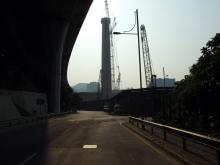"The Empire, long united, must divide..."
Primary tabs
It is a very grim picture indeed.
For the British, the French and the Americans, the First Opium War was a small colonial war, with not many dead, resulting in the normal victory for the Forces of Enlightenment, Christianity, Free Enterprise and drug dealing.
It was very different for the Chinese.
The defeat of the Qing Empire by the British in the First Opium War was a tremendous shock. It can best be compared to Martians landing in the United States and destroying California. For three thousand years, China had been the centre of civilisation; respected by all the other nations in the world, from Japan to Vietnam to Central Asia, collecting tribute from them whilst supplying them with high culture and wise guidance. Furthermore, under the sixty year long reign of the Qianloong Emperor, within living memory, the Central Kingdom had advanced to its greatest extent .
A bunch of barbarians from a distant island had been graciously allowed to buy articles of value from the Celestial Empire, but, when they had been ordered to cease distributing foreign mud, instead of complying with an Order from the Throne, they had struck back, viciously, defeating Imperial troops, spreading ruin and disorder, seizing land and demanding payment of a huge indemnity in silver.
Chinese people were forced to ask themselves whether these events presaged the withdrawal of the Mandate of Heaven from the Qing Dynasty. The Qing, being Manchurians, had never been popular in Southern China, where support for the Ming had lasted longest.
In northern China, which had been less affected by the Opium War, the Huang He, the Yellow River, twice overflowed its banks in the 1850’s, killing tens of thousands by drowning and more by starvation. In this part of China, female infanticide had led to an extreme population imbalance, with perhaps 25% more young men than young women.
China was like a volcano with the vent blocked by centuries of congealed custom, and it erupted.
At this point we need a short summary of the racial position in China. Contrary to what many people have been told, but in accordance with the evidence of one’s own eyes, the Chinese are not all alike. The Han are the majority, but there are minority races who are more or less assimilated and within the Han majority some are more equal than others. In South China, the Hakka (“guest people”) are Han, but there are those who consider them "less Han than others".
A Protestant missionary (a Southern Baptist, be it noted...) taught a young Hakka man the elements of Christianity. The young man had a dream, in which God revealed to him that he was in fact the brother of Jesus...
...and he plunged China into the bloodiest war of any in the nineteenth century, Napoleon and the American Civil War included, by setting up the Heavenly Kingdom of Great Peace.
I am going to resort to shorthand and cite Wikipedia, here, otherwise this is going to get out of control, but, from the Hong Kong perspective, the point to note is that whilst the infant colony was worrying about drains and gas lighting:
and the Praya, now Des Voeux Road:
ghastly things were happening across the length and breadth of China.
Our old friend Qishan was killed in action, early on, against the Heavenly Kingdom of Great Peace:
Tai (great) 太 Ping (peace) 平 Tian (heaven) 天 Guo (kingdom) 國
It should be noted that the missionary who started it all was a Southern Baptist.
http://en.wikipedia.org/wiki/Issachar_Jacox_Roberts
There is a good Wikipedia article on the head of the Taipings here:
http://en.wikipedia.org/wiki/Hong_Xiuquan
and here is the Wikipedia article on the rebellion itself, including its eventual defeat by the Ever Victorious Army under Frederick Townsend Ward (an American clipper ship mate) and, after his death, Charles Gordon (as in Khartoum) and the more conventional forces of the Qing Dynasty under reform minded bureaucrats such as Li Hongshang and Zeng Guofang.
http://en.wikipedia.org/wiki/Taiping_Rebellion
A point that I would like to make is that the Taiping rebellion was one of four huge rebellions all going on at more or less the same time, the others being the Nien Rebellion in the Northeast and no less that two very serious Moslem uprisings in the West - the Hui Rebellion and the Du Wenxiu Rebellion.
The striking thing, in fact, is not that Qing China almost collapsed, but that it survived at all (largely thanks to Li Hongshang and Zeng Guofang...)
If we figure on a death toll, across these four rebellions, of around thirty million people, we won't be far wrong.
(Please note the reason why modern China takes an extremely dim view of Moslem separatism, by the way...)


Comments
Miao Rebellion
A fifth rebellion for you, simultaneous with the Muslims and Taiping: the Miao Uprising in Guizhou. 5 million people killed.
Miao Rebellion
Thanks.